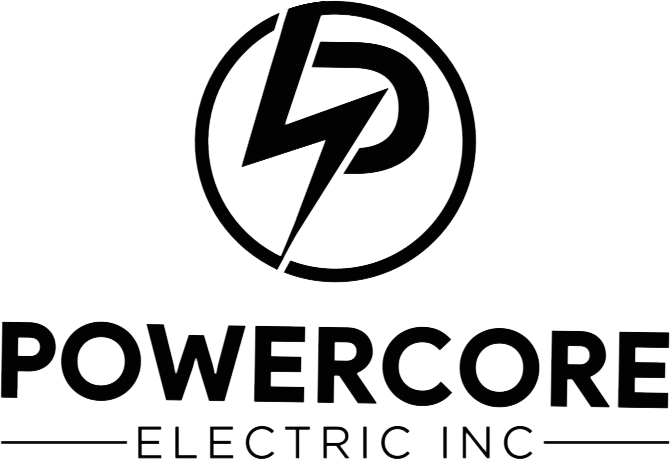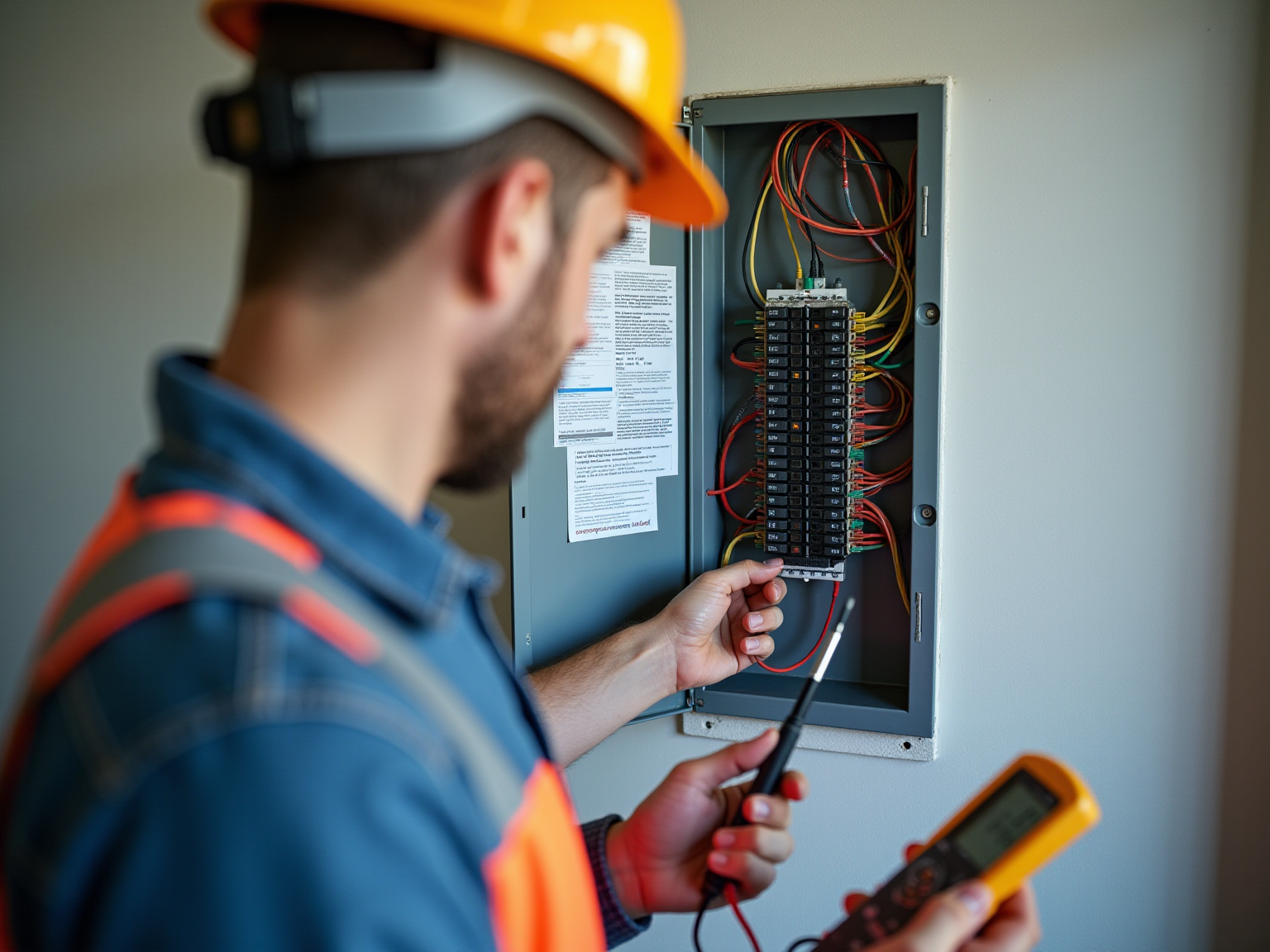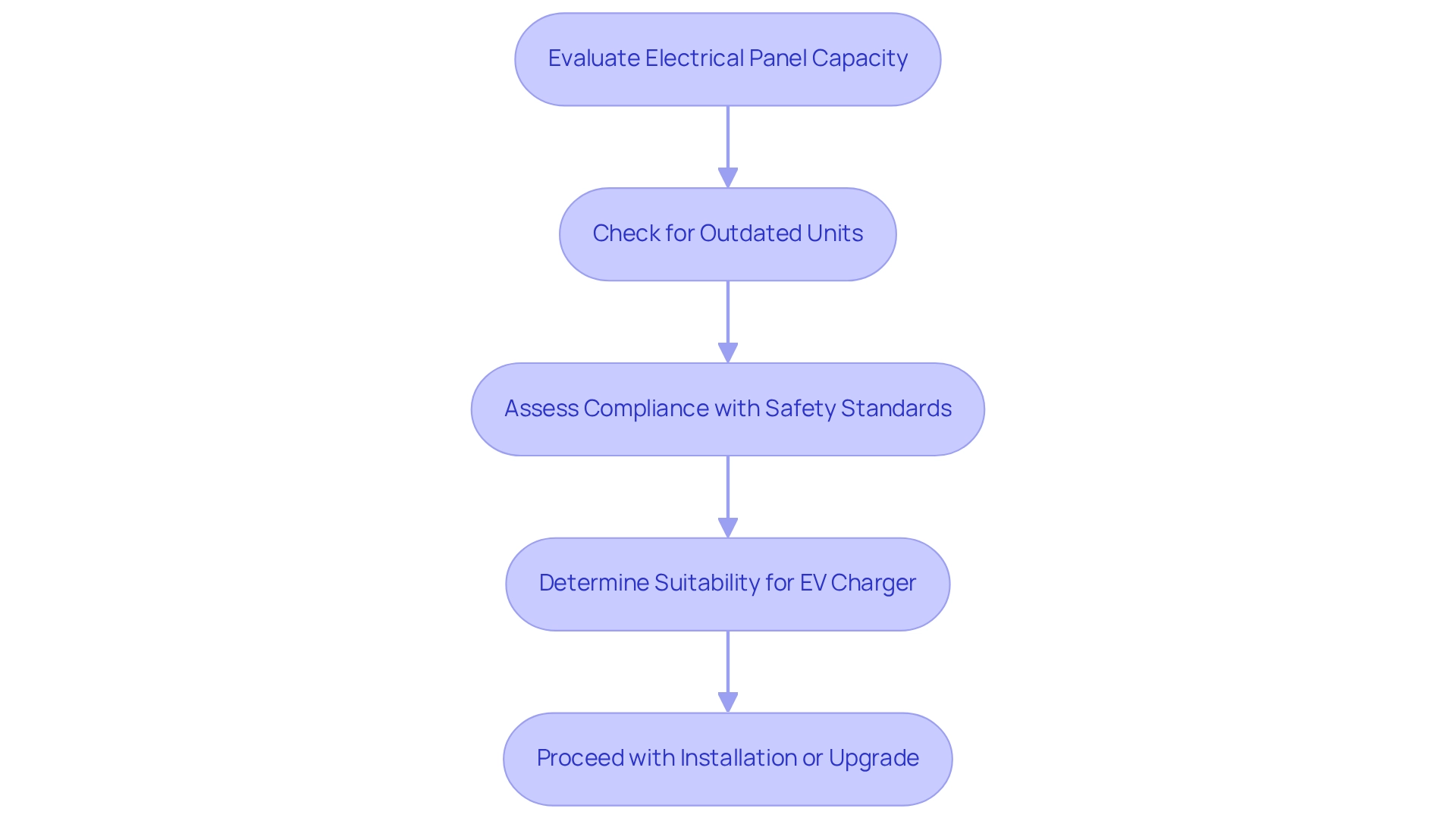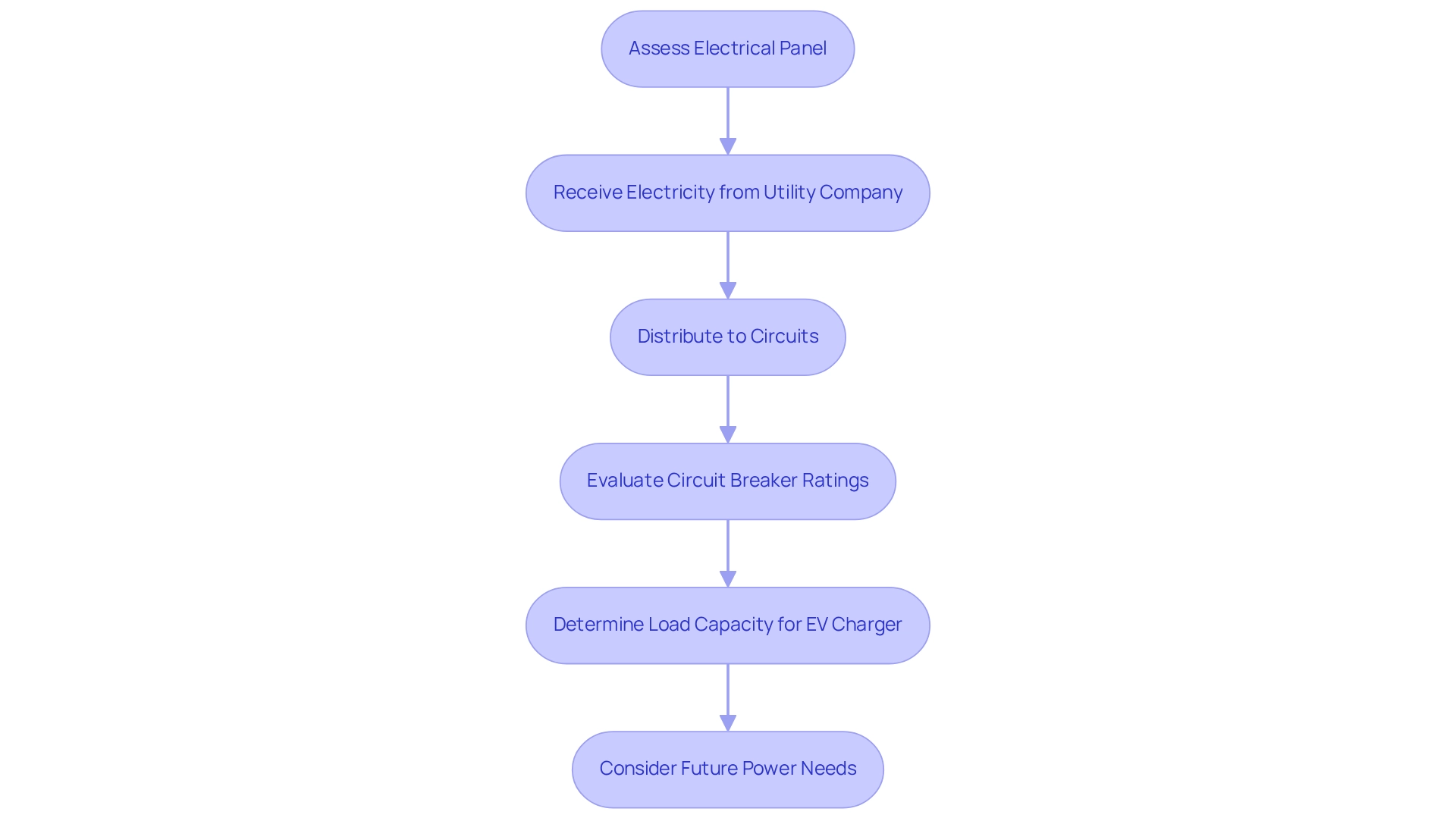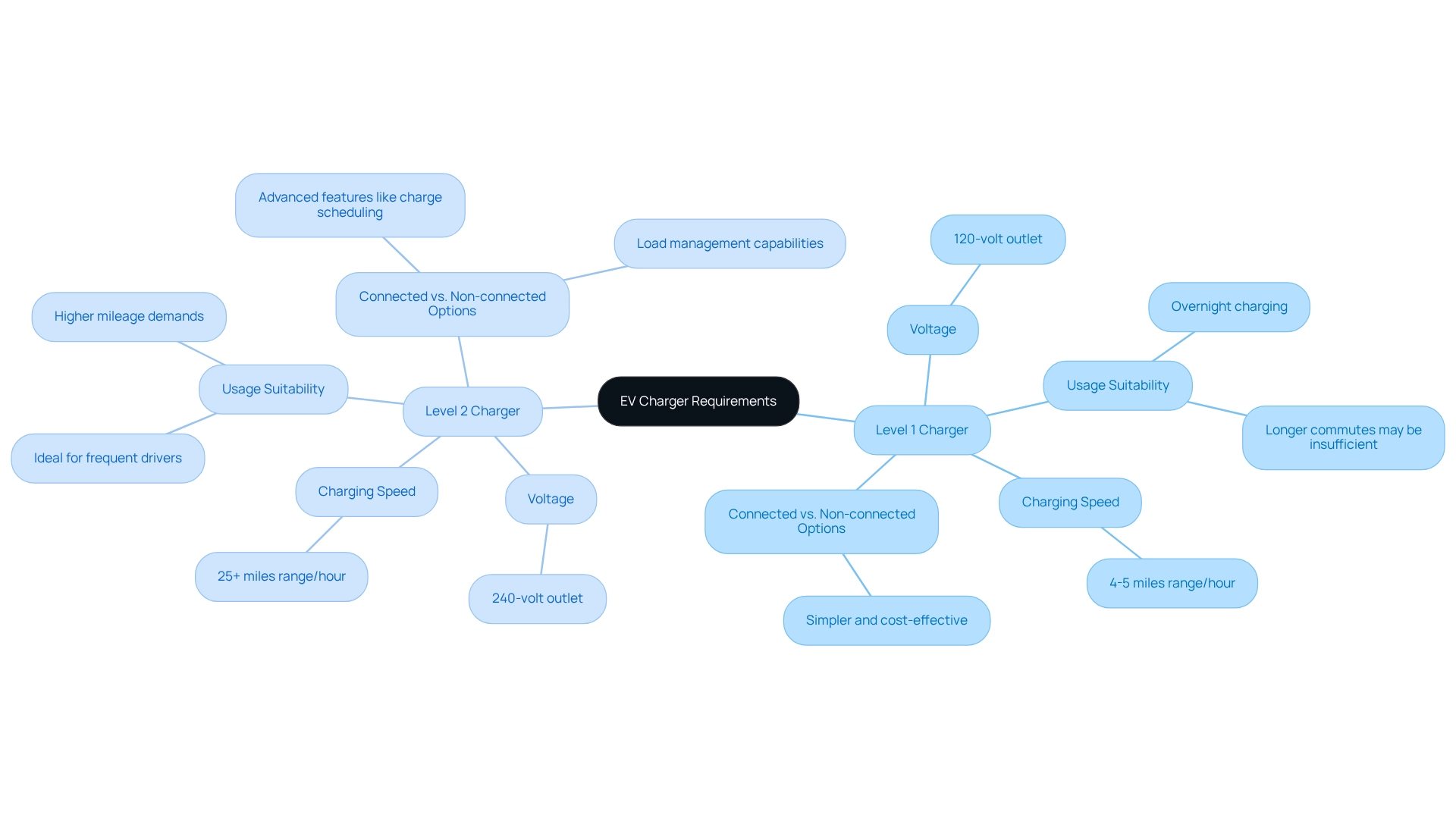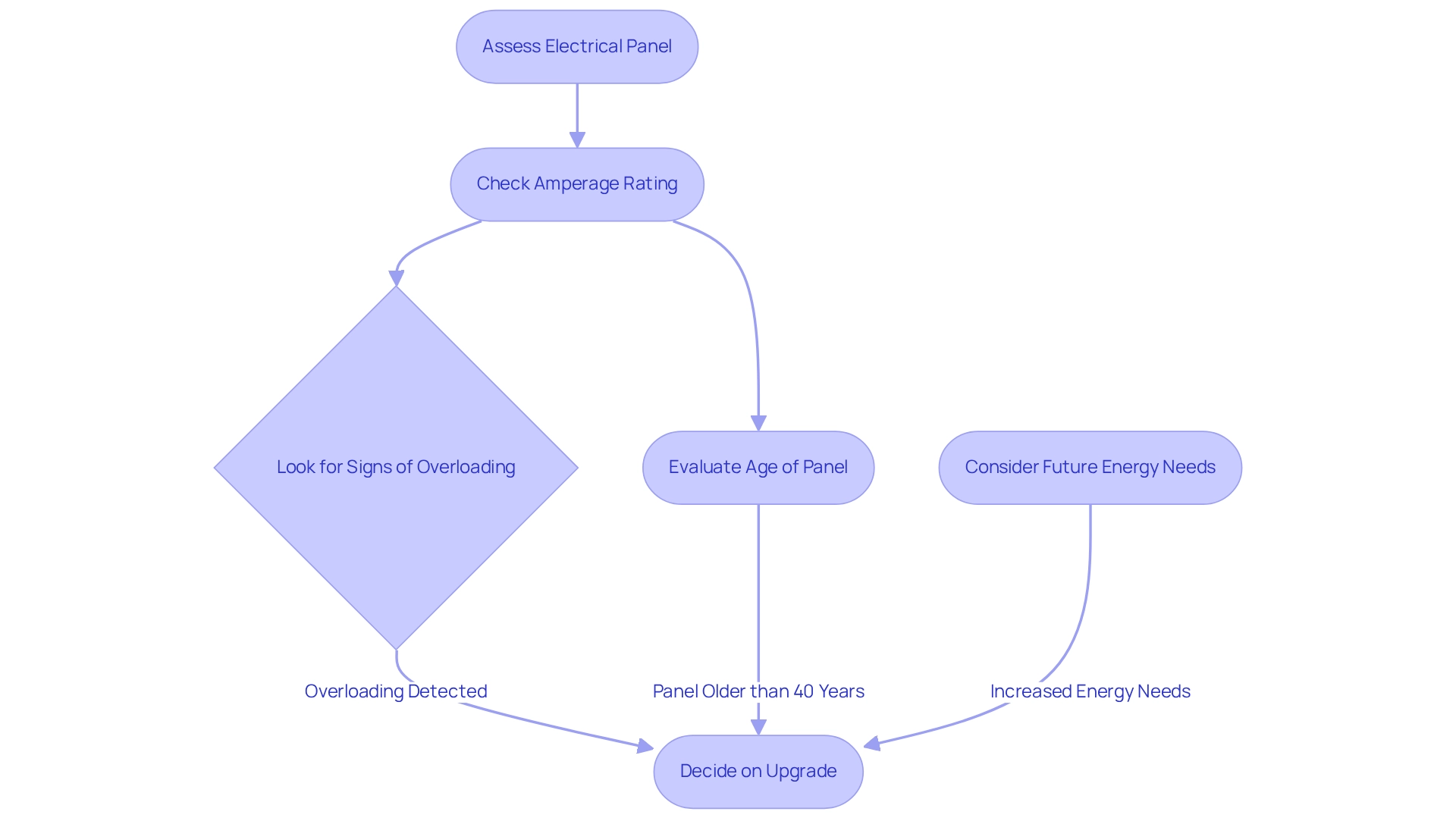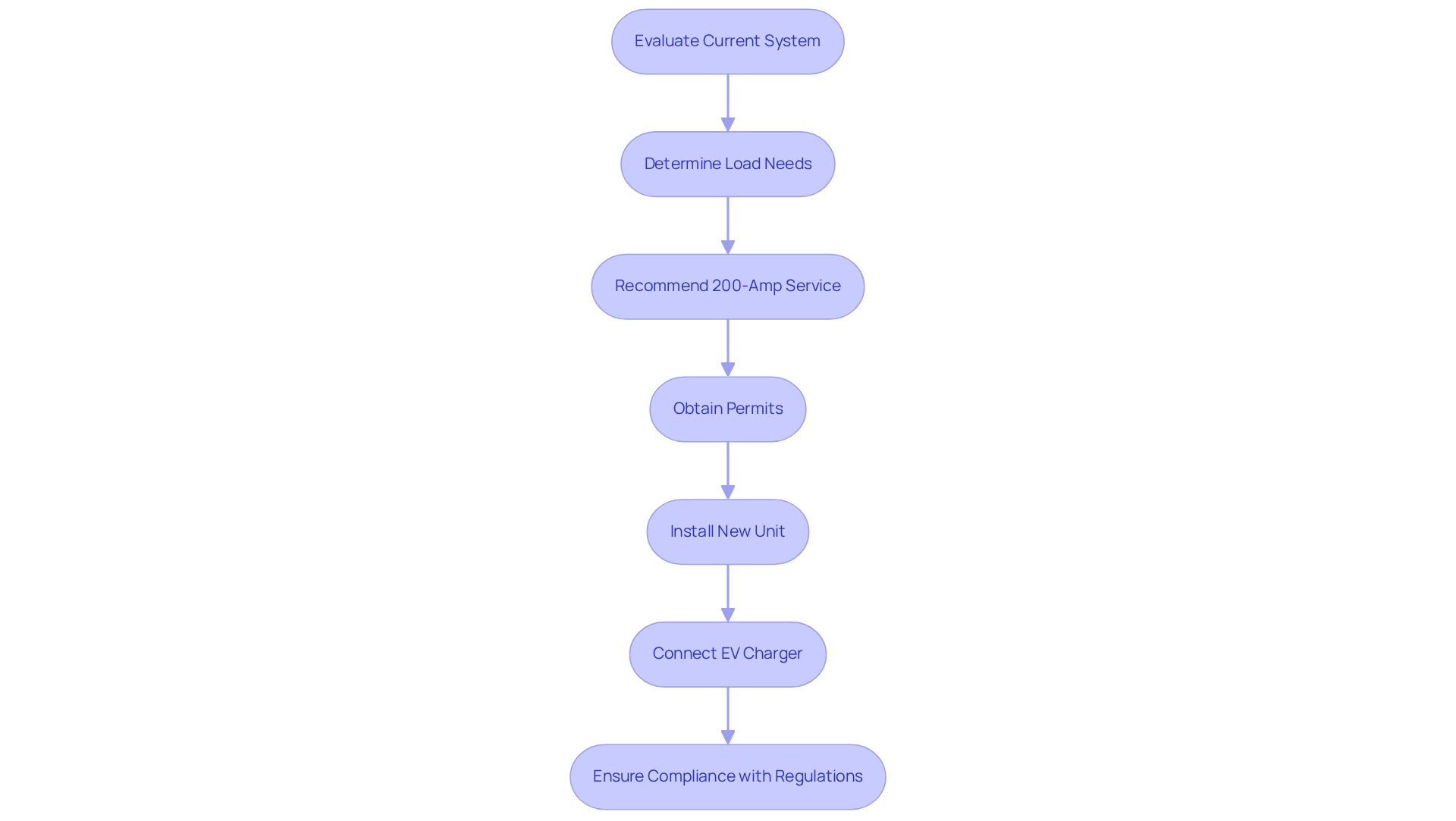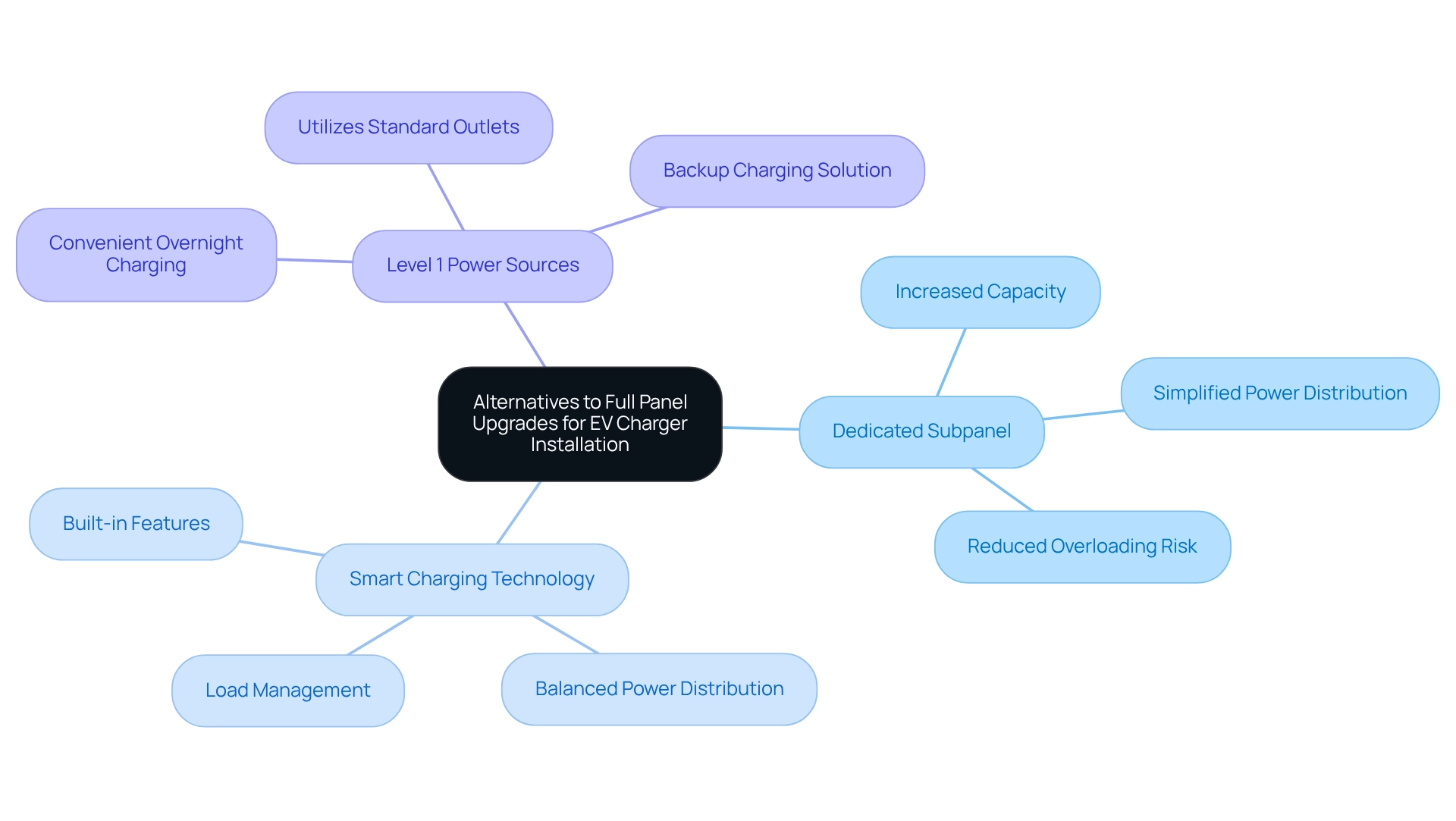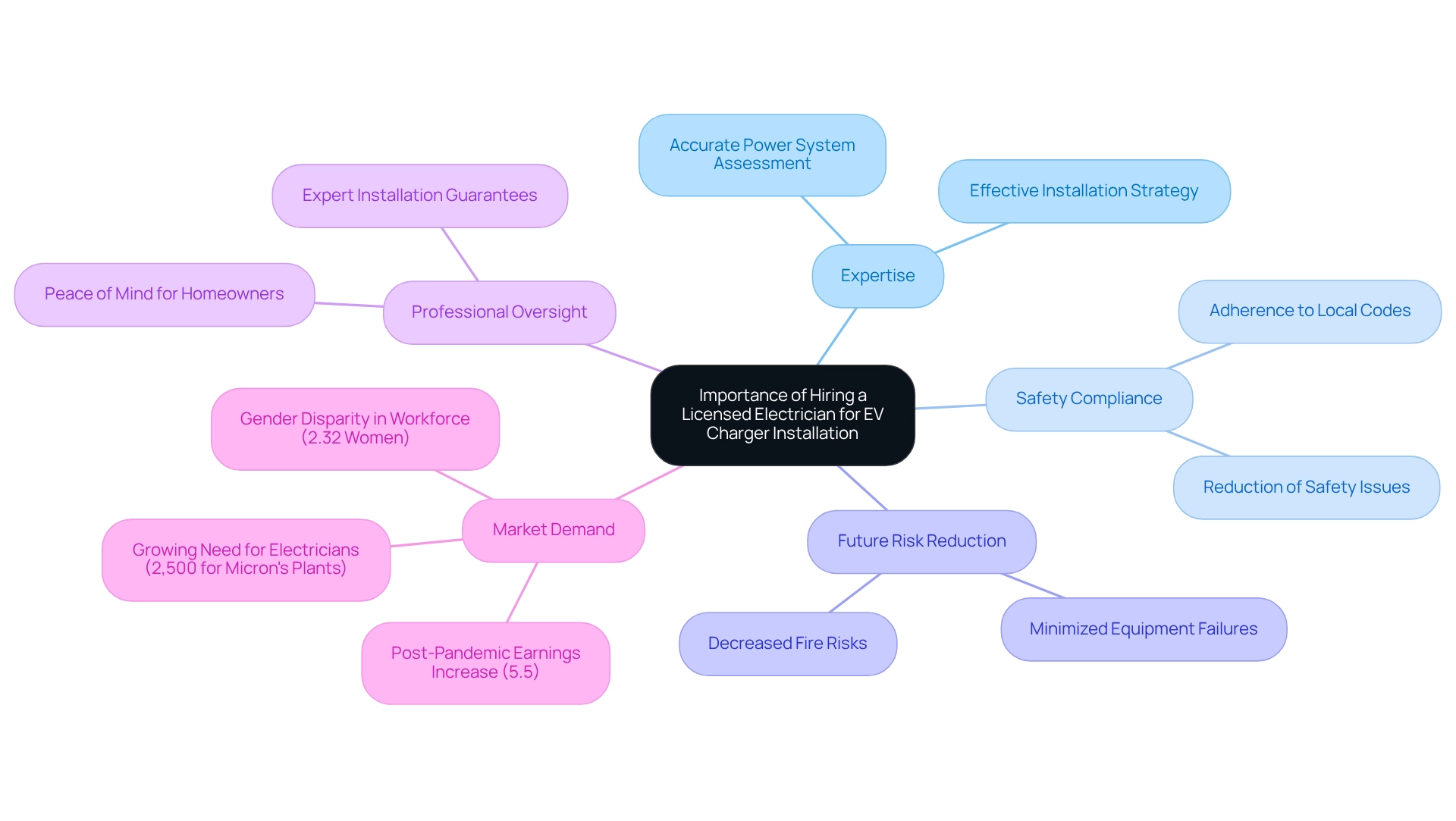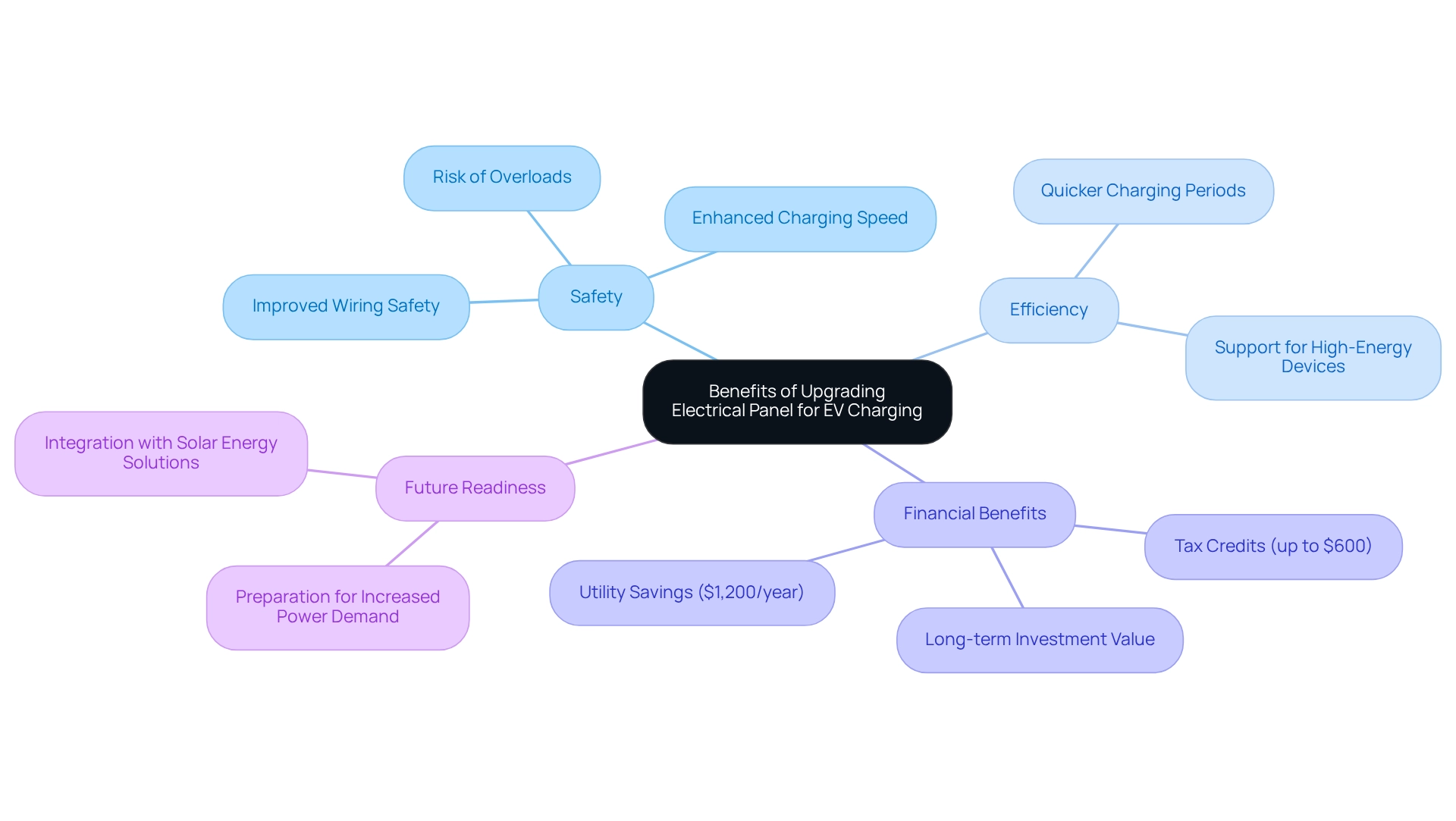Overview
We understand that many homeowners are concerned about the capacity of their electrical panels, especially when considering the addition of an EV charger. To ensure safety and efficiency, it’s crucial to assess your panel’s amperage rating and its ability to handle the extra load from the charger.
Ideally, a 200-amp service is recommended for most homes to accommodate these chargers without the risk of overloading outdated systems. This highlights the importance of a thorough evaluation and potential upgrades.
Together, we can explore these options to help you embrace energy independence while ensuring your home remains safe and efficient.
Introduction
As electric vehicles (EVs) gain traction, we understand that many homeowners are concerned about how to prepare their electrical systems for this new era of transportation. It’s common to feel overwhelmed by the thought of ensuring your home can safely support the demands of EV chargers. The journey begins with recognizing the significance of electrical panel capacity, a crucial element that determines whether your home is equipped to handle these new energy needs. With the potential risks of overloading and electrical fires looming, evaluating and upgrading your electrical panel is not just a recommendation—it’s a vital step towards ensuring safe and efficient charging.
In this article, we’ll explore the essential steps you can take to assess your electrical panel, the various charger options available, and the expert guidance that can help you navigate this transition smoothly. Together, we can highlight the importance of professional installation, ensuring that your home and investments are safeguarded. Let’s embark on this journey toward energy independence and sustainability, making informed decisions that benefit both your household and the environment.
Understanding the Importance of Electrical Panel Capacity for EV Chargers
Before moving forward with the setup of an EV charging device, we understand that it’s crucial to determine if your electrical panel can handle an EV charger. An inadequate assembly can lead to overloading, significantly raising the risk of fires and potentially damaging your home’s wiring system. By correctly evaluating your system’s capacity, you can ensure that your electrical panel is ready for an EV charger, enabling safe and efficient charging.
This evaluation is a vital first step for homeowners transitioning to electric vehicles, as it lays the groundwork for all subsequent assessments and decisions. Recent statistics reveal that insufficient power distribution units are a primary factor in fire incidents, underscoring the importance of adhering to contemporary safety regulations. It’s common to feel overwhelmed, but substituting outdated units, like Zinsco models, is a recommended step to enhance reliability and safety, boosting the performance of your power system.
As Jeromy Newton, Vice President of Operations at Powercore Electric, emphasizes, ‘Ensuring your power distribution system meets current safety standards is vital for determining if your electrical panel can handle an EV charger and the safe functioning of any new devices.’ By prioritizing this assessment, you can safeguard your property while enjoying the benefits of electric vehicle ownership with peace of mind.
Furthermore, Powercore Electric offers a variety of services to assist you in your shift to renewable energy solutions, including the installation of high-efficiency solar units, dependable battery backups, and cutting-edge EV charging stations. Acknowledging the safety hazards linked to insufficient power systems for EV charging highlights the need to determine if your electrical panel can handle an EV charger, which is crucial for ensuring a safe and effective charging experience for homeowners. Together, we can navigate these changes and embrace a more sustainable future.
What is an Electrical Panel and How Does It Work?
A power distribution unit, often referred to as a breaker box, serves as the central hub of your home’s wiring system. It plays a crucial role by receiving electricity from the utility company and distributing it to various circuits throughout your home. Inside the enclosure, circuit breakers are placed to safeguard your home from power surges, automatically turning off electricity when necessary to avert possible dangers.
We understand that assessing your power distribution system’s operation is vital, especially when considering whether your electrical panel can handle an EV charger. Many residences, particularly those built earlier, may have wiring systems rated below 200 amps, which can raise concerns about whether your electrical panel can accommodate an EV charger and restrict its ability to manage additional loads. Notably, 59% of multi-family properties are fitted with intermediate-sized units, highlighting the importance for homeowners to evaluate their existing systems and contemplate enhancements if needed.
The significance of assessing your power distribution board cannot be overstated. A properly operating system ensures that your home can efficiently distribute electricity to all appliances, and it is essential to consider if your electrical panel can handle an EV charger, particularly for high-demand devices. A recent discussion among homeowners and experts regarding the electrical needs of a large, all-electric residence emphasized that a 200A service is typically sufficient for most homes.
Participants exchanged views on load assessments and the need for future-proofing through larger units, stressing the importance of preparing for potential increases in power consumption.
As Scott Caron, a Master Electrician, observed, “installing a new service unit is a vital step in ensuring your home can meet contemporary power requirements.” By understanding how your power distribution unit operates and its ability to allocate electricity, you can assess if your system can handle an EV charger. This understanding not only improves your home’s resource efficiency but also aids your transition to sustainable power practices.
For homeowners in Northern California, Powercore Electric provides reliable general power services, including the installation of EV charging stations, solar panels, and battery backups. Their expertise ensures that your electrical system is optimized for resource efficiency and future requirements. Additionally, Powercore Electric offers a range of energy-saving devices, including top power-saving power strips, which can further help reduce energy bills and enhance overall efficiency.
EV Charger Requirements: Levels and Power Needs
Electric vehicle (EV) power sources come in various levels, with Level 1 and Level 2 being the most common choices for home use. We understand that when it comes to charging, convenience is key. Level 1 devices utilize a standard 120-volt outlet, making them suitable for overnight charging. However, it’s important to note that their charging speed is relatively slow, typically delivering about 4 to 5 miles of range per hour. This can raise concerns for those with longer commutes who may find a Level 1 power source insufficient for their daily needs.
On the other hand, Level 2 devices require a 240-volt outlet and significantly enhance charging efficiency, providing around 25 miles of range per hour or more. This rapid recharging capability makes Level 2 units ideal for homeowners who need to power up their vehicles quickly, especially those who drive frequently or have higher mileage demands.
Understanding the power requirements of these units is crucial. For instance, a standard EV with a consumption rate of 0.50 kWh per mile might use approximately 583 kWh each month. This highlights the importance of ensuring your electrical panel can accommodate an EV charger. It’s common to feel overwhelmed by these technical details, but assessing your daily driving patterns and mileage can guide you in selecting the most suitable charging device.
Moreover, a case study comparing connected and non-connected Level 2 charging solutions reveals that connected options offer enhanced features such as charge scheduling and load management. These capabilities can be beneficial for optimizing power usage and potentially reducing costs. Homeowners should reflect on how these features align with their energy management strategies. In contrast, non-networked devices are often simpler and more cost-effective, making them suitable for homes where advanced functions may not be necessary.
As the demand for electric vehicle charging stations continues to grow in California, grasping these differences and requirements will empower homeowners to make informed decisions about their EV charging options. Furthermore, exploring solar energy solutions with Powercore Electric can significantly contribute to reducing or even eliminating electric bills, complementing the use of EV chargers. Powercore Electric also offers solar module installation and battery backup options to enhance your energy efficiency.
Together, let’s compare quotes from various installers to ensure you find the best solutions tailored to your power needs and budget. This approach can lead to a more sustainable and cost-effective energy solution for your home. For more information, please reach out to Powercore Electric at (916) 699-8778 or email ryan.serrano@powercoreinc.net. We’re here to support you in your journey towards energy independence.
Assessing Your Current Electrical Panel: Key Indicators for Upgrade
To effectively evaluate your current electrical system, we understand that it can feel overwhelming. Start by determining its amperage rating, which is usually found on the main breaker. Common ratings include 100 amps and 200 amps, with many modern homes opting for 200 amps to accommodate increased energy demands. Look for signs of overloading, such as frequently tripped breakers, flickering lights, or a unit that feels warm to the touch—these are clear indications that your system may be under strain.
If your power distribution unit is over 20 years old or shows noticeable signs of deterioration, it’s common to think about an upgrade. Circuit breaker units typically endure for 25 to 40 years, so if yours is approaching the end of its lifespan, proactive replacement can avert potential safety risks. Together, we can ensure your home remains safe and efficient.
When preparing to set up a Level 2 EV charger, it is essential to consider whether your electrical panel can handle the additional load. Many homes experience electrical overload issues, which can lead to safety risks and increased energy costs. Bill Wichers, a knowledgeable member, emphasizes, “I would never install a main service with less than a 40 space capacity, and I would be very hesitant to implement less than 200A service in a new home or a significant renovation project.”
By assessing your group’s capacity and acknowledging these key indicators, you can make informed decisions about necessary upgrades that can lead to long-term savings.
In a recent case study, Powercore Electric addressed a homeowner’s concern regarding whether their electrical panel could handle an EV charger for their new electric vehicle charging station in California. Following a comprehensive site evaluation, the team suggested an upgrade to a 200 amp service, addressing the question of whether your electrical panel can handle an EV charger and also improving the overall efficiency of the home. This proactive approach not only mitigated the risk of overload but also contributed to long-term savings on energy bills.
Powercore Electric’s in-house team of experts ensures high-quality installations and maintenance, reinforcing the credibility of these recommendations. For additional details about our offerings, including solar systems, battery backups, and general power services, please reach out to us at Powercore Electric. Together, let’s work towards a safer and more energy-efficient future.
How to Upgrade Your Electrical Panel for EV Charging
Enhancing your power system is a vital step for homeowners who are curious about whether their electrical panel can support an EV charger. This process often requires the expertise of a certified electrician. At Powercore Electric, we genuinely understand the unique electrical needs of California communities, ensuring that our services are tailored to your specific requirements. We begin with a thorough evaluation of your current system and your home’s load needs to determine if your electrical panel can indeed accommodate an EV charger.
Based on our assessment, our electricians frequently recommend upgrading to a 200-amp service. This raises an important question: can your electrical panel handle an EV charger? Generally, this size is sufficient for homes equipped with EV chargers.
Upgrading may involve obtaining necessary permits and adhering to local building regulations, both of which are crucial for safety and functionality. Our team is dedicated to meticulous craftsmanship, ensuring that every installation meets the highest standards of quality and safety. Once the new unit is in place, our electricians will connect the EV charger, ensuring that all wiring complies with regulations and is safe for use.
In California, the average cost of upgrading a power distribution system ranges from $500 to $1,800, depending on various factors such as the complexity of the installation and the specific needs of your home. With the increasing number of electric vehicles on the road, the demand for certified electricians is on the rise, and Powercore Electric is here to support homeowners in this transition with our customer-first approach.
It’s essential for homeowners to prioritize hiring licensed electricians for these enhancements. Their expertise in managing the complexities of power systems ensures compliance with safety regulations. Signs that your power panel may need replacement include:
- Frequent power surges
- Flickering lights
- Overheating appliances
Addressing these issues not only protects your investment but also improves the reliability of your home’s electrical infrastructure, leading to the question of whether your electrical panel can safely power an EV charger along with other appliances.
By choosing Powercore Electric, you can rest assured that your installation will be executed accurately and effectively, helping you achieve your electrification goals with sustainable power solutions.
At Powercore Electric, we are committed to providing sustainable power solutions that not only benefit your home but also contribute to a greener planet. Don’t just take our word for it—our satisfied customers have praised our dedication to quality and service. Contact us today for a free, personalized estimate, and let us assist you in powering your home with clean energy.
Alternatives to Full Panel Upgrades: Options for EV Charger Installation
When contemplating whether your electrical panel can handle an EV charger, it’s understandable to seek efficient options without committing to a complete electrical system upgrade. One thoughtful choice is to consider a dedicated subpanel specifically for the EV charging station. This approach allows for increased capacity without the need to replace the entire main unit, making it a financially savvy option for many households.
Imagine relocating a 50A circuit for your vehicle’s power source if necessary, providing the flexibility to meet your power needs.
Another innovative solution is integrating smart charging technology. These systems intelligently manage the power load, ensuring that your current setup remains balanced and avoids being overwhelmed. Importantly, a significant percentage of modern EV chargers come equipped with built-in load management features, which efficiently distribute power across multiple devices, ensuring safe and reliable charging.
Recent insights from industry experts highlight the benefits of subpanel installations for EV chargers. Subpanels can simplify your electrical setup, making power distribution management easier and helping to determine if your electrical panel can handle an EV charger. This not only reduces the risk of overloading the main panel but also enhances your overall experience. Homeowners who opted for subpanels often report smoother installations and improved resource management, especially in homes with several high-demand appliances. Additionally, Level 1 power sources, which utilize standard 110V or 120V outlets, provide a practical option for EV drivers, particularly in scenarios where overnight charging is feasible.
These alternatives not only offer the necessary capacity for EV charging but also contribute to a more sustainable and efficient energy system within your home. As Bgbreeder suggests, it may be worthwhile to consider replacing existing appliances with gas options while navigating the permits and paperwork for electric upgrades, highlighting the practical aspects of such transitions. However, it’s essential to be aware of potential challenges; as one moderator pointed out, there should be no additions to the backup loads section, which can complicate the process of integrating new loads into existing systems.
For more information on EV charging installations, solar panels, and battery backups, or to arrange a consultation, please feel free to reach out to Powercore Electric at ryan.serrano@powercoreinc.net or call (916) 699-8778. Together, we can explore the best solutions for your energy needs.
The Importance of Hiring a Licensed Electrician for EV Charger Installation
Engaging a licensed electrician for your EV charger installation is essential for several meaningful reasons. We understand that homeowners often worry about energy bills and safety, and that’s where these professionals come in. They possess the expertise necessary to accurately assess your power system and determine the most effective installation strategy. Their knowledge ensures that all work adheres to local codes and regulations, which is paramount for maintaining safety standards.
Moreover, expert installations greatly diminish the likelihood of future issues, such as fires or equipment failures, thus offering homeowners invaluable peace of mind. It’s common to feel concerned about the risks associated with DIY installations, especially when statistics indicate that a significant percentage lead to safety issues. This highlights the necessity of professional oversight. In fact, the electrical contracting sector has seen a post-pandemic earnings increase of 5.5%, reflecting the growing demand for skilled electricians who can ensure compliance and safety in installations. As David Long, a representative from NECA, observed, “The electrification of America is presenting a generational career opportunity,” emphasizing the necessity for homeowners to seek dependable power solutions through skilled professionals.
Additionally, the gender disparity in the electrician workforce, with women making up only 2.32% compared to 97.7% men, emphasizes the need for more skilled professionals in the industry. By choosing to hire licensed electricians, homeowners can rest assured that their EV charger installation will be executed with the highest standards of safety and compliance.
Powercore Electric, with over 30 years of experience serving California communities, guarantees high-quality installations and maintenance. Our in-house team of experts is committed to providing unmatched quality craftsmanship and customer-first service, ensuring that clients receive the best service possible. Together, we can support sustainable energy solutions and work towards your power requirements. We look forward to collaborating with you on this journey.
Benefits of a Properly Upgraded Electrical Panel for EV Charging
Improving your power distribution system is crucial for enhancing EV charging at home. We understand that ensuring safety while minimizing the risk of overloads and potential fires is a top priority for many homeowners. It’s important to assess whether your electrical panel can handle an EV charger, especially given the increased power demand associated with electric vehicle charging stations. This improvement not only guarantees safety but also boosts the efficiency of your EV charger, resulting in quicker charging periods.
Moreover, a modernized power system contributes to the overall safety of your home’s wiring, offering you peace of mind. For instance, homes equipped with contemporary power systems, typically rated between 200 to 400 amps, can effectively manage the demands of high-energy devices alongside an EV charger. In contrast, older houses with systems rated below 60 amps may face circuit overloads, raising concerns about whether your electrical panel can meet today’s energy requirements.
Smart panels enable seamless enhancements to support electric vehicle charging and home automation, further increasing their value.
Investing in a panel upgrade not only addresses your current EV charging needs but also prepares you for future power requirements. You might find it comforting to know that homeowners can benefit financially, as the Inflation Reduction Act allows for tax credits of up to $600 for system upgrades, making this investment even more appealing. As Pergola shared, her yearly power usage declined by 40%, leading to savings of $1,200 on utility bills and $500 on taxes after enhancing her power system.
By ensuring your electrical panel is up-to-date, you enhance both the safety and effectiveness of your home, setting the foundation for a sustainable energy future.
Furthermore, Powercore Electric offers a variety of services, including solar panel installations and battery backups, which can further enhance your home’s power efficiency and sustainability. By integrating solar energy solutions with your EV charging setup, you can maximize your savings and contribute to a greener future. Together, we can work towards a more sustainable and efficient energy landscape.
Conclusion
Preparing your home’s electrical system for the transition to electric vehicle ownership is a critical step that cannot be overlooked. We understand that as you embrace this change, ensuring your home is ready can feel overwhelming. By assessing and potentially upgrading your electrical panel, homeowners can ensure that their systems can safely accommodate the additional load required for EV chargers. This proactive approach not only mitigates the risk of overloads and electrical fires but also enhances the efficiency of charging, providing peace of mind.
Understanding the different levels of EV chargers and their power requirements is equally important. Have you evaluated your daily driving habits? This reflection can help you select the appropriate charger type, while also considering the benefits of smart charging technology and subpanels as effective alternatives to full panel upgrades. Engaging a licensed electrician for installation ensures compliance with safety standards and local codes, further safeguarding your home’s electrical infrastructure.
Investing in an upgraded electrical panel is not merely about meeting current demands; it also prepares your home for future energy needs. With potential financial incentives available, this upgrade can lead to long-term savings on energy bills while supporting sustainable practices. Together, by making informed decisions and seeking professional guidance, we can confidently embrace the era of electric vehicles, contributing to a greener future for all.
